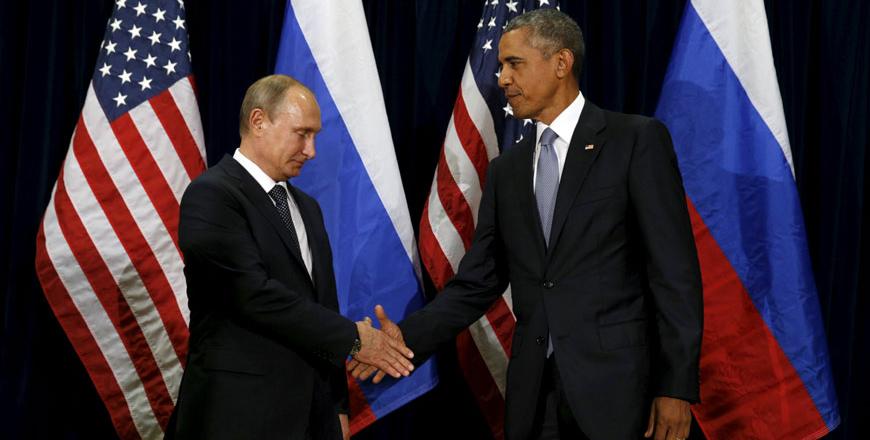You are here
Obama and Putin: Awkward moments, few breakthroughs
By AP - Sep 30,2015 - Last updated at Oct 01,2015

US President Barack Obama and Russia’s President Vladimir Putin pose for members of the media before a bilateral meeting on Monday (AP photo)
NEW YORK — US President Barack Obama and Russian President Vladimir Putin's first formal meeting in more than two years started with an awkward handshake and ended without a breakthrough on Syria, a crisis that has strained their already tense relationship.
On the biggest issue that divides them in Syria — the status of embattled leader Bashar Assad — Obama and Putin left their discussions Monday exactly where they started. The US still insists Syria's future cannot include Assad, while Putin appears to only want to bolster the standing of his longtime ally, casting him as the best defence against Daesh militants.
Even so, both leaders appeared interested in whether their meeting on the sidelines of the United Nations General Assembly could yield progress towards ending Syria's four-and-a-half year civil war. After the 90-minute sit-down at UN headquarters, Putin and US officials who described the meeting on Obama's behalf each spoke of the need for cooperation.
"Strange is it may seem, there were many common points," Putin told reporters. "There were also disagreements which we agreed to work together. I hope this work will be constructive."
US officials said the leaders agreed to explore ways to pursue a resolution to a crisis that has left more than 250,000 dead, even as they made clear Obama wasn't bending on his insistence that Assad not be part of the eventual solution.
Secretary of State John Kerry said Tuesday that Russia must understand that there can be no peace in Syria without removing Assad because the Sunni majority there will accept nothing else. A legitimate peace process must involve talks among a "complicated brew" of nations from the region, he said on MSNBC's "Morning Joe".
"We have staring us in the face here an enormous possibility to see a way forward," Kerry said.
The crisis has taken on fresh urgency amid Russia's recent military buildup in Syria. Putin has cast the increased presence of equipment and troops there as part of the effort to defeat Daesh, and suggested Monday that Russia could launch airstrikes against the militants.
"We are thinking about it and don't exclude anything," he said.
It's unlikely Putin would join the US-led coalition already launching strikes against the militants. He said Russia will only take such a step in accordance with international law, and criticised the US and its allies for striking the Syrian territory without UN permission.
Monday's meeting marked another chapter in Obama's and Putin's history of colourful and tense encounters. They laid the groundwork for the meeting in dueling speeches at the UN, and then were forced to sit together at lunch, exchanging steely glances as they clinked champagne glasses during a toast. They appeared briefly before reporters before beginning their talks, quickly shaking hands, but making no remarks.
That the leaders met at all underscored Obama's acceptance of Russia's increasingly prominent role in resolving the crisis in Syria. The US president has resisted granting Putin the legitimacy of a formal bilateral meeting following the Russian president's provocations in Ukraine. But White House officials calculated that it was worth bending on that front for the opportunity to assess Putin's Syria motivations in person.
The meeting also highlighted Putin's ability to command attention and shift it away from the Ukraine. A fragile peace plan in the former Soviet republic remains shaky at best, yet the crisis was largely a footnote at the UN gathering.
Instead, attention was riveted on what Putin would say about Syria and Assad as he arrived in New York for his first UN meeting in a decade. In the weeks leading up to his arrival, Putin ratcheted up his country's military presence in Syria and struck an intelligence-sharing agreement with Iran, Syria and Iraq, another nation fighting the Daesh.
Both developments caught US officials off guard.
Putin also moved swiftly to try to capitalise on the failure of US efforts to train and equip moderate Syrian rebels — a $500 million Pentagon programme that was supposed to yield more than 5,000 fighters but instead only has only a handful of active graduates. The Russian leader jabbed Obama over the programme failures in his remarks to the UN General Assembly on Monday.
The global landscape looks far different than what some in the Obama administration envisioned earlier this year.
Fresh off the success of Iranian nuclear negotiations that resulted in a rare alignment among Russia, China and the West, some US officials wondered whether that partnership could serve as a model for tackling other crises, including Syria. Officials also suggested there was reason to be optimistic that Putin was growing impatient with Assad.
Privately, some US officials say they still believe Putin is inclined to cooperate with the US to ease Assad from power. They've raised the prospect that Putin's increased military footprint in Syria isn't just to prop up Assad, but perhaps also to curry favour with whoever might replace him.
Related Articles
NEW YORK — Russia's President Vladimir Putin launched a new coalition to battle the Daesh terror group in Syria on Sunday, as he prepared to
ANKARA — Russian President Vladimir Putin will next week host Turkish and Iranian counterparts Recep Tayyip Erdogan and Hassan Rouhani for s
UNITED NATIONS — Russia and the United States agreed on Monday to look for a diplomatic end to the Syrian civil war but clashed over the cen
















